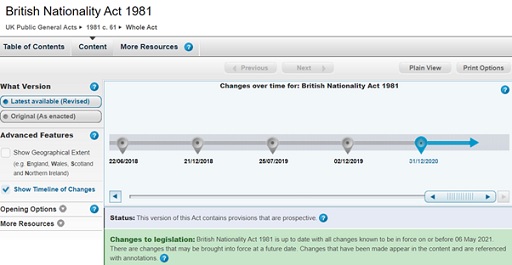4 Amending primary legislation
Primary legislation is often amended; this is particularly true of any primary legislation relating to immigration law. Here’s one of a number of amendments that the Immigration Act 2016 made to the Immigration Act 1971, adding a section on illegal working [Tip: hold Ctrl and click a link to open it in a new tab. (Hide tip)] :
34 Offence of illegal working
- The Immigration Act 1971 is amended as follows.
- In section 3(1)(c)(i) (power to grant limited leave to enter or remain in the United Kingdom subject to condition restricting employment or occupation) for “employment” substitute “work”.
- After section 24A insert—
“24B Illegal working
- A person (“P”) who is subject to immigration control commits an offence if—
- P works at a time when P is disqualified from working by reason of P's immigration status, and
- at that time P knows or has reasonable cause to believe that P is disqualified from working by reason of P's immigration status.
- For the purposes of subsection (1) a person is disqualified from working by reason of the person's immigration status if— [continues]
Both the original primary legislation and amendments can be brought into force via what are known as ‘commencement orders’.
Commencement orders (or appointed day orders) are a form of Statutory Instrument designed to bring into force the whole or part of an Act of Parliament which for some reason it is not desired to put into effect immediately upon Royal Assent […]
There may be more than one per Act (the Town and Country Planning Act 1971 had 75 such Orders) and there is in general no requirement as to the time after Royal Assent in which such an order must be brought in – e.g. the Easter Act 1928 (which stipulates a fixed date for Easter) has not yet had a commencement order made, though it is open to the Home Secretary to make one if general agreement on fixing a date is reached. These are generally not subject to Parliamentary procedure and are simply laid.
In Activity 1, you explored the Immigration Act 1971, an example of an Act that has been amended several times (legislation.gov.uk, 1971). The commencement order is in Section 35 of the Act:
35 Commencement, and interim provisions.
- Except as otherwise provided by this Act, Parts I to III of this Act shall come into force on such day as the Secretary of State may appoint by order made by Statutory Instrument; and references to the coming into force of this Act shall be construed as references to the beginning of the day so appointed.
- Section 25 above, except section 25(2), and section 28 in its application to offences under section 25(1) shall come into force at the end of one month beginning with the date this Act is passed.
It is important to understand how primary legislation comes into force, and that it may come into force in stages and is often amended.
You can check whether a provision in a particular Act has been brought into force on legislation.gov.uk. You can also search for commencement orders: the Immigration Act 2016 has seven.
Although there is a checking process, mistakes can be made and subsequently corrected: for example, a correction to the Immigration Act 2016 (Home Office, 2018). The detail on this is beyond what is required for this course, but being aware that you need to check (and recheck) these details and be precise are important skills for an immigration adviser.
There are several helpful sections on legislation.gov.uk if you want to explore in more detail how and why legislation operates. In Activity 2, you can become familiar with a piece of legislation that has been amended on several occasions.
Activity 2: Exploring legislation
Go to legislation.gov.uk.
Search for the British Nationality Act 1981 and spend some time exploring the table of contents and some of the sections – it has been amended several times.
As you look at the sections of the Act, note the ‘Advanced Features’ tab in the left-hand column. If the tickbox next to ‘Show Timeline of Changes’ is ticked, you’ll be able to see a timeline of amendments made to each section, or to the whole Act. The ‘What Version’ tab enables to you look at the text of the original Act before the amendments were made.

